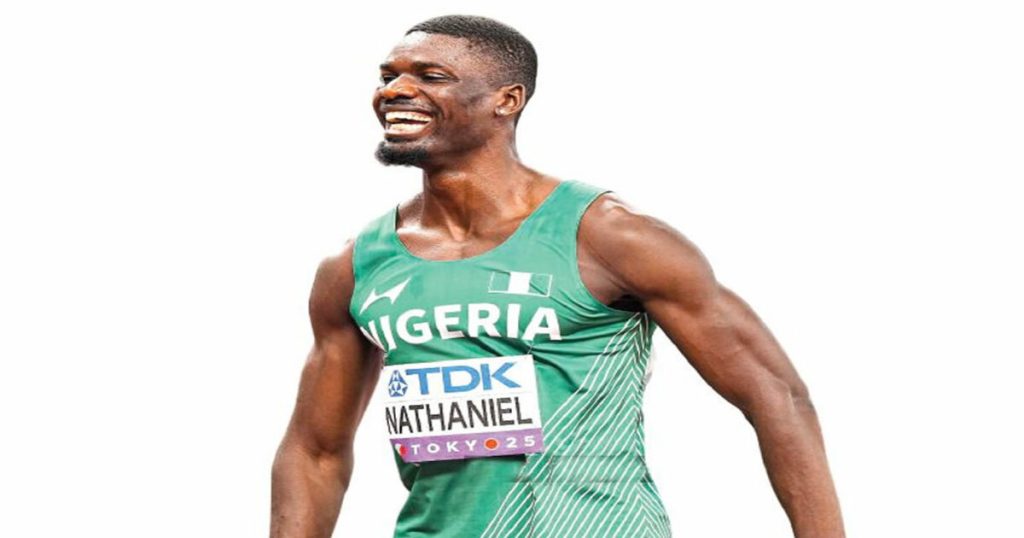Paragraph 1: A Near Miss and a National Record
Ezekiel Nathaniel, Nigeria’s rising star in the 400m hurdles, etched his name in the nation’s athletic history at the World Athletics Championships in Tokyo. While he narrowly missed a bronze medal, finishing fourth in a dramatic final, the 22-year-old shattered his own national record, clocking an impressive 47.11 seconds. This remarkable feat made him only the second Nigerian, following in the footsteps of Henry Amike in 1987, to reach the prestigious 400m hurdles final at the World Championships. Nathaniel’s performance sparked hope and inspiration among aspiring Nigerian athletes, demonstrating the potential for greatness on the global stage. This compelling near-miss, coupled with a historic record, encapsulates a story of both ambition and achievement.
Paragraph 2: The Drama and the Disqualification
The 400m hurdles final was a rollercoaster of events. American Rai Benjamin initially crossed the finish line first but was disqualified for knocking over the final hurdle, a decision that momentarily elevated Nathaniel to the bronze medal position. This unexpected turn of events generated intense suspense and anticipation. However, Benjamin’s subsequent appeal was swiftly upheld, reinstating him as the gold medalist. Brazil’s Alison Dos Santos and Qatar’s Abderrahman Samba secured the silver and bronze medals respectively, leaving Nathaniel agonizingly close to a podium finish. This dramatic sequence of disqualification and reinstatement added another layer of complexity to an already thrilling race.
Paragraph 3: Graciousness in Defeat, Optimism for the Future
Despite the disappointment of missing out on a medal, Nathaniel displayed remarkable sportsmanship and maturity. He graciously accepted the reversal of the disqualification, acknowledging the fairness of the decision and commending Benjamin’s efforts. Far from being disheartened, Nathaniel expressed satisfaction with his personal best performance and the invaluable experience gained from competing against the world’s best athletes. He viewed the race as a stepping stone towards greater achievements, emphasizing his belief in his untapped potential and his commitment to continuous improvement. This positive outlook underscores his resilience and dedication to his athletic journey.
Paragraph 4: A Meteoric Rise in the Hurdles
Nathaniel’s ascent in the 400m hurdles has been nothing short of meteoric. Born in 2003, he began making waves in 2022 as a freshman at Baylor University, breaking Amike’s long-standing Nigerian record with a time of 48.42 seconds. His progress accelerated dramatically in 2024, culminating in a triumphant victory at the NCAA Outdoor Championships in Eugene, Oregon, where he clocked an impressive 47.49 seconds—the third-fastest time in NCAA history. He further solidified his dominance by becoming the first athlete in NCAA history to run a sub-48-second time in the 400m hurdles semifinal. This rapid progression highlights his exceptional talent and dedication to honing his craft.
Paragraph 5: Tokyo: A Testament to Progress and Potential
The Tokyo performance marks another significant milestone in Nathaniel’s burgeoning career. While his fourth-place finish mirrors Amike’s result from the 1987 World Championships, the context is drastically different. Nathaniel’s national record-breaking run signifies not just personal achievement but also a resurgence of Nigerian athletics in the 400m hurdles. His performance provides a beacon of hope for future generations of Nigerian athletes, demonstrating that they too can compete at the highest level of international competition.
Paragraph 6: Nigeria’s Performance in Tokyo: A Step Forward
Although Tobi Amusan was Nigeria’s sole medalist in Tokyo, winning gold in the 100m hurdles, the overall performance of Team Nigeria represented a marked improvement from the previous World Championships in Budapest, where the nation failed to secure any medals. Nathaniel’s near-miss in the 400m hurdles, coupled with Amusan’s victory, signals a positive trajectory for Nigerian athletics. These performances provide a foundation for future success and inspire optimism for the nation’s prospects on the global stage. They underscore the potential for continued growth and development within Nigerian athletics.














